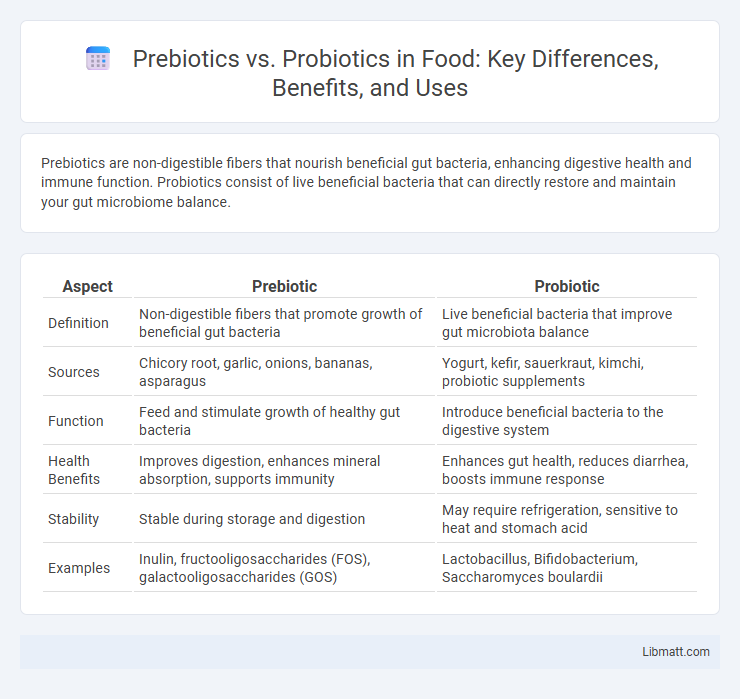Prebiotics are non-digestible fibers that nourish beneficial gut bacteria, enhancing digestive health and immune function. Probiotics consist of live beneficial bacteria that can directly restore and maintain your gut microbiome balance.
Table of Comparison
| Aspect | Prebiotic | Probiotic |
|---|---|---|
| Definition | Non-digestible fibers that promote growth of beneficial gut bacteria | Live beneficial bacteria that improve gut microbiota balance |
| Sources | Chicory root, garlic, onions, bananas, asparagus | Yogurt, kefir, sauerkraut, kimchi, probiotic supplements |
| Function | Feed and stimulate growth of healthy gut bacteria | Introduce beneficial bacteria to the digestive system |
| Health Benefits | Improves digestion, enhances mineral absorption, supports immunity | Enhances gut health, reduces diarrhea, boosts immune response |
| Stability | Stable during storage and digestion | May require refrigeration, sensitive to heat and stomach acid |
| Examples | Inulin, fructooligosaccharides (FOS), galactooligosaccharides (GOS) | Lactobacillus, Bifidobacterium, Saccharomyces boulardii |
Introduction to Prebiotics and Probiotics
Prebiotics are non-digestible fibers that promote the growth of beneficial gut bacteria, improving digestive health and enhancing immune function. Probiotics are live microorganisms, such as Lactobacillus and Bifidobacterium strains, that when ingested, restore or maintain the natural balance of gut microbiota. Both prebiotics and probiotics play crucial roles in supporting a healthy microbiome and preventing gastrointestinal disorders.
What Are Prebiotics?
Prebiotics are non-digestible fibers and compounds found in certain foods that selectively stimulate the growth and activity of beneficial gut bacteria. Common sources include dietary fibers like inulin, fructooligosaccharides (FOS), and resistant starches found in garlic, onions, bananas, and whole grains. By nourishing these beneficial microbes, prebiotics support digestive health, enhance immune function, and improve nutrient absorption.
What Are Probiotics?
Probiotics are live microorganisms, primarily bacteria and yeasts, that provide health benefits when consumed in adequate amounts by improving or restoring the gut flora. Common probiotic strains include Lactobacillus, Bifidobacterium, and Saccharomyces boulardii, which support digestion, enhance immune function, and prevent harmful pathogen growth. These beneficial microbes are naturally found in fermented foods like yogurt, kefir, sauerkraut, and dietary supplements formulated to promote gastrointestinal health.
Key Differences Between Prebiotics and Probiotics
Prebiotics are non-digestible fibers that serve as food for beneficial gut bacteria, while probiotics are live bacteria or yeasts that directly add to the population of healthy microorganisms in the digestive system. Prebiotics primarily promote the growth of beneficial microbes, enhancing gut microbiota balance, whereas probiotics introduce new strains to improve gut health. The key difference lies in their function: prebiotics nourish existing bacteria, and probiotics replenish or boost the microbial community.
Health Benefits of Prebiotics
Prebiotics primarily promote digestive health by selectively stimulating the growth of beneficial gut bacteria, such as Bifidobacteria and Lactobacilli, which enhance nutrient absorption and immune function. They can also improve metabolic health by regulating blood sugar levels and reducing inflammation, supporting conditions like irritable bowel syndrome (IBS) and obesity management. Consuming prebiotic-rich foods like chicory root, garlic, and onions provides the necessary dietary fiber that serves as fuel for these beneficial microbes, contributing to overall gut microbiota balance and long-term wellness.
Health Benefits of Probiotics
Probiotics are live microorganisms that support digestive health by restoring the natural balance of gut bacteria, which can improve symptoms of irritable bowel syndrome and reduce diarrhea caused by infections or antibiotics. These beneficial bacteria enhance your immune system by promoting the production of natural antibodies and may reduce inflammation throughout the body. Consuming probiotics through supplements or fermented foods like yogurt and kefir can contribute to better nutrient absorption and overall gut health.
Food Sources of Prebiotics
Prebiotics are non-digestible fibers found in foods such as garlic, onions, leeks, asparagus, bananas, and whole grains that nourish beneficial gut bacteria. These dietary fibers stimulate the growth and activity of probiotics, which are live beneficial microorganisms in fermented foods like yogurt and kimchi. Including a variety of prebiotic-rich foods in Your diet supports a healthy microbiome and enhances overall digestive health.
Food Sources of Probiotics
Fermented foods such as yogurt, kefir, sauerkraut, kimchi, and miso are rich sources of probiotics, containing beneficial live bacteria like Lactobacillus and Bifidobacterium strains. These probiotics support gut health by enhancing the balance of intestinal microbiota and improving digestion. Consuming a variety of probiotic-rich foods ensures a diverse population of beneficial microbes that contribute to immune function and overall wellness.
How to Incorporate Both for Gut Health
Incorporate prebiotics and probiotics into your diet by consuming fiber-rich foods like garlic, onions, and bananas, alongside fermented foods such as yogurt, kefir, and sauerkraut to support gut microbiota. Consider supplements containing Lactobacillus and Bifidobacterium strains paired with prebiotic fibers like inulin or fructooligosaccharides (FOS) to enhance gut health synergistically. Consistent intake of both prebiotics and probiotics promotes a balanced microbiome, improves digestion, and strengthens immune function.
Choosing the Right Supplement: Prebiotic vs Probiotic
Selecting the right supplement depends on gut health goals, where prebiotics serve as dietary fibers that nourish beneficial bacteria, while probiotics introduce live bacteria directly to the digestive system. For individuals seeking to enhance microbiome diversity and improve digestion, probiotics such as Lactobacillus and Bifidobacterium strains offer targeted support. In contrast, prebiotics like inulin and fructooligosaccharides optimize existing bacterial growth, making them ideal for maintaining long-term gut health.
Prebiotic vs Probiotic Infographic

 libmatt.com
libmatt.com